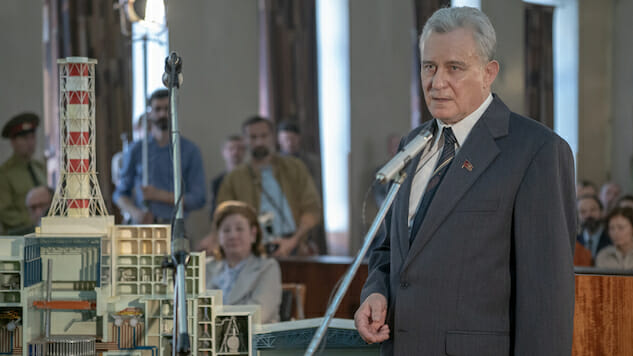The Chernobyl Finale Was a Haunting Lesson on the Cost of Lies
The HBO miniseries explained how nuclear reactors work — and don’t — in wonderfully human terms.
Photo Courtesy of HBO TV Features
Chernobyl saved the full explanation of the 1986 nuclear disaster until its fifth and final hour, “Vichnaya Pamyat,” using the same tactics it did earlier in the season to maximize our dread, except this time in new ways. Initially, even those with a passing knowledge of the nuclear meltdown knew that a scene of children playing in radioactive ash was going to end badly (even if its characters didn’t yet), but the horror grew as we were introduced not only to the barely-avoided global scope of the disaster, but of the human cost it took to keep it contained. This was magnified throughout the series’ short run of episodes, but never more so than in its finale. “Vichnaya Pamyat” starts with serene scenes of a town and its inhabitants who don’t yet know that a hellmouth is about to open up and destroy them. But more than that, these are now faces we recognize from the series. We know them as men, women, and children who will die horribly in the chaos of the fallout.
Craig Mazin’s HBO miniseries was such an exceptional journey exactly because it always focused on the humanity of the Chernobyl disaster. The tension was thus two-fold: we knew what was going to happen to these people even before they did, but that was augmented to an even more horrifying place because of the culture of lies within the Soviet state at that time. Even as the reactor core was melting down, Dyatlov would not acknowledge that it was happening. We then saw those costly mistakes, led by Dyatlov, play out in the series’ first and last episodes in ways that you couldn’t help but viscerally react to. This all didn’t happen just because of a machine failure or innocent human error, it came down to the arrogance of three men—and one in particular—who were so hell-bent on chasing meaningless bureaucratic glory that their egos almost led to the end of the world. It’s so staggeringly unnecessary it nearly sears you from the inside out.
Chernobyl saved its lesson on how the reactor failed until this last hour, which was an unusual but right choice for several reasons. Firstly, it forced us to go through the chaos and uncertainty of the meltdown with the rest of the characters without knowing why things were happening or how to fix them (at least, for those of us who are not nuclear engineers). It also allowed us to sit with the full scope of the disaster for four hours before being told how it all works—or doesn’t. Truly, what other dramatic series has ever spent as much time in an episode as “Vichnaya Pamyat” did literally educating viewers? I walked away from the hour knowing the basics of how a nuclear reactor works and why Chernobyl had such a catastrophic failure, which is an incredible feat of storytelling. Not to mention that it was all extraordinarily compelling! Making what could be such dry material so dramatic is part of the wonder of this series, and it’s down, again, to our human connection to what happened. The fury one feels hearing how many ways Dyatlov put those men in danger, and the series of events that led to a slow death march towards the ultimate horror of Chernobyl, cannot be overstated. For a series to master both the dramatic and educational (historical and scientific) in tandem is truly astounding.
Much of this also came down to the fantastic case, and Jared Harris likely will (and should) win an Emmy for his layered and exceptional portrayal of Valery Legasov. But Emily Watson’s quiet, persistent pursuit of the truth shouldn’t be forgotten, nor should we overlook Stellan Skarsgard’s performance, which made for one of the series’ most outstanding arcs as Boris came to terms with the reality of what was happening. This wasn’t something that could be brushed under the rug for the sake of state secrets. He came so far from the first episode, ultimately standing up to his comrades and demanding they let Valery speak the truth. The episode even takes the time for Boris—who knows he’s dying —to silently observe an inch worm and acknowledge the beauty of an Earth that was nearly blown to smithereens. Even as they sat in a radioactive area, life was finding a way.
Eventually, “Vichnaya Pamyat” shows us the ghost town that now exists in the place where a thriving community once was, already haunted by the ghosts of those who died trying to stop the horror. Everything about Chernobyl was maddening, and Mazin’s series never let up on that tension. We’re meant to be driven mad by it, even though there is some kind of hope in the end of there were valuable lessons learned. Yet everything marches inevitably towards an epilogue that chronicles the deaths, sacrifices, displacement, illnesses (including heightened cancer rates among children), and the political legacy of the disaster. All of it is set to a haunting a capella choral piece, with Valery’s words still hanging in the air. “The truth doesn’t care about our needs or wants […] This, at last, is the gift of Chernobyl: Where I once would fear the cost of truth, now I only ask ‘what is the cost of lies?’” As the series proved, it’s too high.